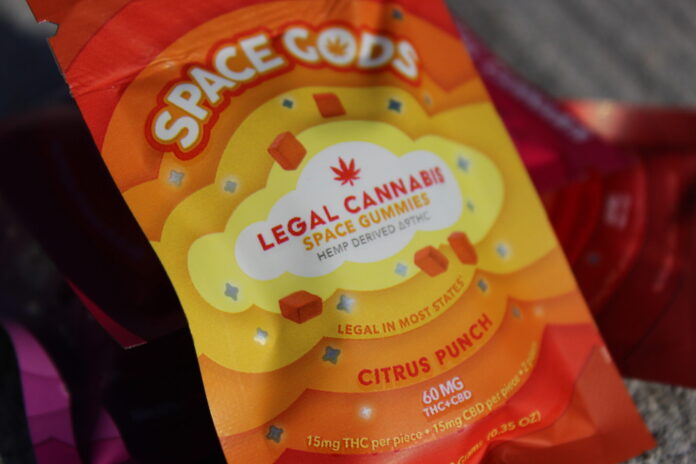Baton Rouge, LA (4/20/20230 – Some consider Louisiana a haven for legal cannabis in the Deep South, even though recreational marijuana remains off limits. But now that a fledgling industry has developed to meet growing demand for one particular type of product, businesses in the field fear they’ll be nipped in the bud by a proposal a state Senate committee advanced Tuesday.
Louisiana legalized industrial hemp in 2018, opening the door for growth of the cannabis strain used to make textiles, rope, construction materials and paper products. The following year Louisiana became the first state in the nation to reach a cooperative endeavor agreement with the U.S. Department of Agriculture to start farming hemp. Lawmakers then approved the sale of products made with cannabidiol (CBD), the active ingredient in hemp that cannot make users high and is not addictive, for limited purposes.
Since then, the hemp industry has established a firm foothold in the state. In addition to more than 1,000 acres where the crop is farmed, a host of businesses have emerged in the wholesale, manufacturing and retail sectors. CBD is now readily available in oils and ointments. The legislature tweaked hemp regulations last year and even legalized products with limited amounts of THC — the high-inducing compound found in weed — resulting in a variety of edible and potable forms sold over the counter with no medical recommendation or supervision required.
A key difference between hemp and marijuana is that you’re not supposed to be able to get high from consuming industrial hemp, which isn’t legally available in smokeable form. Hemp contains less than 0.3% THC, the psychoactive compound in cannabis, and more cannabidiols, while marijuana has more THC and less CBD.
Unlike medical marijuana, which must be sold through one of 10 state-licensed dispensaries and their affiliate locations, hemp CBD products are available just about anywhere you’ll find a cash register. This widespread availability is one reason why state lawmakers are now taking a closer look at hemp and products derived from it.
A bigger factor is that some 230 hemp products that some lawmakers said should not have gotten state approval were cleared for sale to the public due to ambiguity in a law the legislature passed last year. That law also created confusion over the labeling requirements of consumable hemp that contains both CBD and THC. Individual servings of a hemp beverage or chocolate bar might have the legally allowable amounts of THC, but the entire package or container exceeds that level.
Since being made aware of the gaffe, the state Office of Alcohol and Tobacco Control (ATC) has pulled some hemp products from retailers, leading industry members to wonder if they’ve wasted money on their investments.
Underage consumption addressed
Hemp business owners gathered Tuesday for a Senate Agriculture Committee meeting at the Capitol where Sen. Stewart Cathey Jr., R-Monroe, brought forward a bill to prohibit the manufacturing and sale of “recreational adult-use intoxicating substances” made from hemp-derived products.
“Last session, we unknowingly created a recreational THC market here in Louisiana where anyone with an ID saying they’re 21 years old can buy products over the counter, through the internet, that can get the user high,” Cathey said.
You could smoke acres and acres and acres of this and never get high.
– Jason Garcee, Southern Roots Hemp Farm owner
Cathey, who chairs the Senate Agriculture Committee, shared multiple stories of children having ingested THC products, some having obtained them from friends at school, even though sales are banned to people under 21. His bill also requires sellers to check the IDs of purchases, post notices that no one under 21 can buy hemp edibles, and it authorizes the ATC to conduct stings with underage buyers.
Opponents of Cathey’s bill say the medicinal use of hemp products, based on listed instructions, do not make the consumer high. If lawmakers want to ban gummies, drinks and other edible CBD offerings, then alcohol should be held to the same standard, hemp interests told lawmakers.
“Can these substances be abused? Of course they can — just like narcotics, alcohol and even sugar,” Bill Richard, an addiction recovery specialist and founder of Blue Basin Canna of Lafayette, told the committee. “…There has not been one documented case of a death directly related to hemp-derived delta-8 or delta-9 products. You can’t say that about alcohol, and you can’t say that about other narcotics.”
Delta 8 and 9 are specific THC compounds found in different strains of hemp. Most of the new hemp edibles hitting stores are made with Delta 8 or 9, which is often marketed as a stronger substance.
Business owner calls out bill sponsor
Jason Garsee, co-founder of Southern Roots Hemp Farm in Monroe, said he got into the industry after seeing his son suffer a seizure while driving a car at 70 mph. From the passenger seat, he was able to bring the car to a stop. Garsee said his son started having seizures at age 16. He’s now an LSU student making As and Bs and regularly takes the hemp products Southern Roots makes, his father said. He’s also taking the lowest dose of his anti-seizure medication.
“My son’s not a drug addict. He don’t get high. He don’t get euphoric,” Garsee told lawmakers.
Garsee also recalled having been introduced to Cathey over lunch two years ago, and he said the senator was enthusiastic about plans for Southern Roots. Cathey promised to contact Garsee for a tour of his facility, but Garsee said he never heard from the senator again.
“Do we want regulation? Absolutely,” Garsee told Cathey at Tuesday’s hearing. “But the bill you’re carrying is putting people out of business in your town, in your parish and in your district. You have not once (consulted) anyone in this industry about what your bill does to this industry.”
Cathey challenged Garsee’s recollection of events, adding that he’s met with Garsee’s “representation” and lobbyists for the hemp industry. “The discussion was never around selling products that could get people high,” the senator said.
Cathey also questioned claims House Speaker Clay Schexnayder, R-Gonzales, made when he sponsored the bill last year that expanded the market for hemp-derived products.
“It was actually even asked last year … ‘Can these products get you high?’” Cathey recalled, “and the answer was an unequivocal, ‘No, it would take a truckload of this stuff to get high.”
“You’re exactly right,” Garsee responded, holding up a gallon bag of hemp bud. “You could smoke acres and acres and acres of this and never get high. I want to stand (behind) what Mr. Schexnayder said. He wasn’t lying when he told you this: You cannot get high from this.”
Before that back-and-forth, committee member Sen. Jay Morris, R-West Monroe, offered an amendment that reduces the amount of allowable THC in edible hemp products from 0.5 mg per serving or 2 mg per package, to 0.3% per serving or package. The change drew audible groans from hemp business owners at the hearing.
Schexnayder’s bill to revise edible hemp standards will be heard in a House committee Thursday.
In-state testing sparse
Tuesday’s committee meeting started with a chemistry lesson of sorts from Rebecca Chaisson and Ronald Porche from the Louisiana State Police Crime Lab. They fielded questions from lawmakers, including Cathey’s request to explain the difference between hemp and marijuana.
“My career spans 20 years at the crime lab,” Chaisson said, “and I can honestly say that I never thought I was going to be sitting in a committee talking about hemp versus marijuana when we have so many other serious drugs.”
The number of hemp product tests the State Police lab performs in criminal cases is increasing, she said, and Cathey’s bill would overwhelm their facility if approved, Chaisson said
Another revelation for lawmakers at the hearing was the scarcity of testing labs in Louisiana. The state Department of Agriculture and Forestry tests hemp crops 30 days before they’re harvested, but the Louisiana Department of Health is responsible for making sure hemp-derived products don’t exceed the allowable amounts of THC.
Mike Vidrine, LDH director of sanitarian services, said the department doesn’t actually test hemp products sold at stores. It relies on the certificate of analysis placed on product labels to ensure the lab that approved the product made sure it doesn’t exceed THC limits.
Vidrine wasn’t sure the health department had the authority to test retail products if there were complaints about the contents, and it would likely work with an out-of-state lab for testing.
Committee member Sen. Katrina Jackson, D-Monroe, revealed what she sees as a gap in enforcement. Alcohol and Tobacco Control licenses and regulates hemp wholesalers and retailers, but ATC Commissioner Ernest Legier confirmed that police and district attorneys aren’t required to report to the agency when they discover products with too much THC. Jackson, who is sponsoring a bill to protect hemp businesses from having their products seized, said she will consider language to close the gap.
The committee advanced the bill without objection, and Cathey ended the nearly three-hour hearing saying he would continue to meet with hemp interests to discuss possible changes to the bill.
Source: Louisiana Illuminator; Author: Greg LaRose





